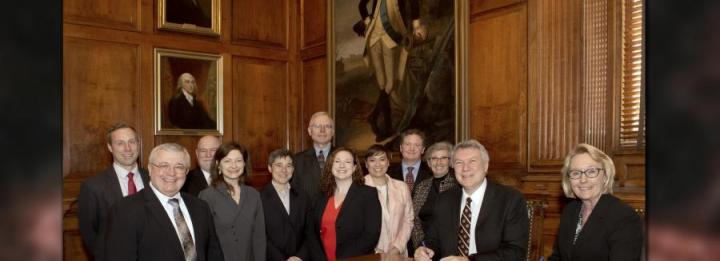Author:
DOE/Princeton Plasma Physics Laboratory
Date
03/18/2019

On March 15, representatives of the US Department of Energy, the Princeton Plasma Physics Laboratory and Princeton University gathered in Nassau Hall on the University campus to sign contracts extending the lease and the primary contract. David McComas, second from right, vice president of PPPL and professor of astrophysical sciences, signed for the University, while Kim Tafe, far right, contracting officer for the DOE-Princeton business management office, signed for the Department of Energy. Also shown, from left: Curt Emmich with the Princeton Regional Chamber of Commerce; Lou Sadler, assistant chief counsel with DOE; Mike McCann, assistant chief counsel with DOE; Debbie Prentice, Princeton's provost; Kristin Muenzen, Office of the General Counsel, Princeton; Pete Johnson, DOE site office manager at PPPL; Chelle Reno, assistant vice president for operations at PPPL; Laura Troche with the DOE Office of Scientific and Technical Information; Brian Bozarth, a financial specialist with DOE-Princeton; Marla Larson Williams, a realty specialist with the DOE Office of Scientific and Technical Information.
The U.S. Department of Energy announced March 15 that Princeton University will continue to manage and operate the DOE's#pl Princeton Plasma Physics Laboratory, located on Princeton University's Forrestal Campus in Plainsboro, New Jersey. The extended contract, which runs through March 31, 2022, also highlights collaborations among the University, the lab and the DOE.
"We are delighted to have this contract extension and continue the critical work at PPPL," said David McComas, vice president of PPPL and professor of astrophysical sciences. "The University is committed to advancing research and science in the service of society, which includes revitalizing its long-term collaboration with DOE."
PPPL is devoted to creating new knowledge about the physics of plasmas -- charged gases -- and to developing practical solutions for the creation of fusion energy. Results of PPPL research have ranged from a portable nuclear materials detector for homeland security applications to universally employed computer codes for analyzing and predicting the outcome of fusion experiments. PPPL research is dedicated to enabling the scientific breakthroughs required to develop fusion as a safe, clean and abundant energy source.
Princeton has had the honor of being the PPPL contractor since its inception in 1951, when it was called Project Matterhorn and under the leadership of Lyman Spitzer. PPPL is one of 10 national science laboratories overseen by DOE's Office of Science.
As part of the agreement, the University extended the lease on the land PPPL occupies for another 30 years with a one-time payment of $1 for as long as Princeton remains the laboratory's management and operations contractor.
The three-year contract extension also emphasizes collaboration:
Princeton will continue to co-sponsor the Facility for Laboratory Reconnection Experiments (FLARE), a powerful new device for advancing research into magnetic reconnection that was assembled at the University and will be housed at PPPL. The agreement specified that the University will fund upgrades to the machine and the DOE will fund project management, infrastructure and commissioning.
PPPL researchers will have priority access to a new suite of computing clusters that are run by the University and housed within the Princeton High-Performance Computing Research Center (HPCRC) and will be compatible with DOE Leadership Class Facilities.
Princeton will continue supporting recently piloted initiatives for graduate students at PPPL, including first-year fellowships, tuition rebates for fourth- and fifth-year graduate students, and a cross-over stipend benefit for graduate students from across the University who perform research at the lab. In the past, some of these benefits were only available to students within the plasma physics program of the Department of Astrophysical Sciences; now, they support students from across the University who engage in research at PPPL.
"We look forward to increasing close collaborations between the University and the DOE," said McComas. "By integrating our unique capabilities, the University, the lab and the DOE can best serve the nation's and world's needs."
EurekAlert!, the online, global news service operated by AAAS, the science society: https://www.eurekalert.org/pub_releases/2019-03/dppl-deu031819.php